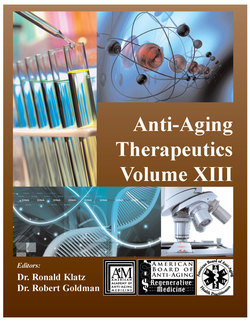Читать книгу Anti-Aging Therapeutics Volume XIII - A4M American Academy - Страница 50
На сайте Литреса книга снята с продажи.
Resveratrol and Cancer
ОглавлениеUnlike beer or spirits, wine consumption follows a J-shaped curve for overall cancer mortality. Though this may be explained in part as a statistical marker for a healthier lifestyle, it has opened the door to a broad field of research into the role of wine phenolics as anti-cancer agents. The topic has been well-reviewed in recent years15 and clinical trials are in progress. Resveratrol has been proposed to unction at several stages including reduced risk of cancer (chemoprevention), anti-cancer therapy via several pathways, and in ameliorating some of the adverse effects of cancer treatments.
Early evidence for this came from studies of resveratrol on cancer cell progression in tissue culture. With several cell types, resveratrol was reported to exert a dose-dependent inhibitory effect, though in specific circumstances the effect is reversed and resveratrol promotes cell proliferation. Nevertheless, the array of cancer types that are inhibited suggest that resveratrol acts at a fundamental level.
These pathways can be understood by dividing cancer therapeutics into three categories according to the stage at which they exert their activity. At the first stage, anti-initiation, resveratrol functions as an anti-oxidant, suppresses mutations by supporting DNA stability, and inhibits activation of pro-carcinogens. Resveratrol has at least four distinct influences in the second stage of cancer, which is known as promotion. These are inhibition of COX-2, which is expressed in many, if not all, types of carcinoma; induction of apoptosis, which is suppressed in cancer cells; decrease in anti-apoptotic proteins, another mechanism by which cancer cells bypass regulatory processes; and down-regulation of cancer activation cellular pathways. The third stage, progression, is where the tumor becomes invasive and spreads. This requires activation of growth factor signaling pathways, on which resveratrol has a specific inhibitory effect. There are also specific effects via other mechanisms on cancer cell invasiveness and growth. A final requirement for tumor proliferation is angiogenesis, which has also been shown to be suppressed by resveratrol. (This latter property suggests other applications for resveratrol in wound healing and conditions such as rosacea.)
The nuclear signaling pathways by which resveratrol is involved have been mapped in considerable detail. Interestingly, many of the points of influence are also targets for curcumin (the spice turmeric), and epigallocatechin gallate (EGCG), a constituent of green tea. This would explain the similar epidemiologic patterns of tea and wine consumption as they relate to cancer.
Wine consumption has also been reported to be associated with less severe fibrosis from radiation treatment in women with breast cancer. As an added benefit, evidence indicates that resveratrol and other wine components help to sensitize tumor cells to radiation while protecting normal cells. A similar paradox applies to chemotherapy, at least in tissue culture and animal studies. This was dramatically demonstrated with doxorubicin and cisplatin in human gynecologic cancer cell lines and in isolated rat hearts.16 If confirmed in clinical trials, these would be very exciting findings but level 1 evidence has not been published so caution is in order.
